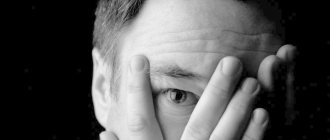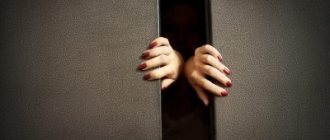Nobody likes to be sick. But there are people who experience panic fear of any disease. They suffer from nosophobia. This condition is accompanied not only by panic, anxiety, depression, but also by physical health symptoms. But this is not the main danger. A phobia is difficult to diagnose, since a person can find a lot of manifestations of various diseases and visit dozens of specialists before he understands what he is really sick with. How to be in this case? What are the ways to overcome nosophobia?
What is nosophobia
In psychology, nosophobia is the most complex pathological fear. Pathology manifests itself in the form of fear of getting sick and leaves an imprint on a person’s lifestyle and character. It is difficult to fight it, but necessary. It is better if this work is carried out comprehensively and in a timely manner, otherwise the disorder will only progress and may turn into a mental disorder.
According to psychologists, nosophobia is a common type of phobia, based either on childhood experiences or on mental exhaustion. In adults, it appears against the background of stress, neurosis, hypochondria and other disorders due to prolonged stress on the psyche or nervous system.
For your information. The phobia of getting sick differs from other phobias in that it does not have a specific object of fear. The subject of fear of getting sick is a generalized syndrome, manifested in the fear of getting sick in general or in the form of panic in front of a specific disease.
This phobia cannot be underestimated, since if untreated it is accompanied by psychosis, forcing a person to become fixated on hygiene rituals associated with the prevention of the disease. So, he can wash his hands many times a day, not touch the door handle, or avoid public places.
Normal or mental disorder
Fear of the dark - what is this phobia called, why does fear arise and how to fight it
To find out what the fear of illness is, you need to compare the categories: is it normal or a mental disorder. From this perspective, phobia is often called hypochondria, since they have very similar syndromes. This is wrong, since hypochondria is a mental disorder due to suspicion of various diseases, and nosophobia has a component inherent in any phobia: frequent attacks of unreasonable panic about a specific disease. This greatly influences the manifestation of pathology.
Frequent attacks of unreasonable panic about a non-existent illness make the course of the phobia severe
Simply put, a hypochondriac begins to suspect that he has all the illnesses at once, including the illness that he read about on the Internet or overheard in the clinic. Nosophobe invents a specific illness for himself, in severe cases of the disorder coming to the conclusion that he has threatening symptoms. Experts who study this phobia note that many people suffer from it. It can create discomfort in life, as it deprives a person of physical and emotional strength.
Important! Psychologists advise the relatives of a nosophobe to convey to him how harmful and severe such a pathology is. First of all, the person himself faces problems. He begins to be tormented by vain fears, worsening the condition of the nervous system and leading himself to a serious disorder. In addition, loved ones also suffer, as they are forced to constantly listen to the complaints of a nosophobe and endure his depression and panic.
Clinic
The symptoms of cancerophobia are extremely varied. It can look like a reactive state (the easiest option), persistent neurosis and even psychosis with hallucinatory-delusional disorders.
Cancerophobia neurosis can be expressed to varying degrees (according to an interview with Alexander Methodovsky, deputy chief physician for medical work at the St. Petersburg City Clinical Oncology Center; AiF, 2010):
- A person is afraid of cancer, but does not take any action. Although the thought of a possible illness often arises in him, he is able to pull himself together and not subject his entire life to diagnostic searches.
- The person is afraid of cancer and is constantly being examined. Although he understands that his suspicions are not supported by anything, he cannot cope with them. He constantly imagines what will happen when he dies, feels sorry for his children and other relatives, is anxious, and suffers from insomnia.
- A person is afraid of cancer, is constantly examined, takes “preventive” medications, eats kilograms of cauliflower and pineapples, because he read that they prevent the occurrence of malignant diseases, and generally adheres fanatically to a healthy lifestyle.
- A man is sure that he has cancer, which doctors simply cannot detect, and no one understands his torment and suffering. People often hate them because they don't have cancer and don't know what it's like. Perhaps he is convinced that his tumor was found a long time ago, but is being hidden.
- There is another option. A person is so afraid of discovering a tumor that he deliberately avoids going to the doctor and undergoing examinations aimed at identifying the tumor. Essentially, this is an animal reaction at the level of instinct - to hide or run away when danger arises. Sometimes the fear of cancer is so great that people do not go to the doctor even if they observe frightening symptoms.
Main forms of disease phobia
Fear of water - as it is scientifically called
Experts call a phobia the fear of disease. Depending on what exactly a person is afraid of getting sick, common variants are identified. Their terms come from the name of the disease:
- get heart disease - cardiophobia;
- fear of a heart attack - heart attack phobia;
- fear of angina attacks - anginophobia;
- fear of getting cancer - cancerophobia or oncophobia;
- diabetic disorders – diabetes phobia;
- fear of catching AIDS - speedophobia;
- fears of syphilis - syphilophobia;
- fear of developing dementia - dementophobia.
For many nosophobes, the most common symptoms are cardiophobia and cancerophobia. Experts remind that all phobias are considered a serious mental diagnosis, since it is difficult for a person to live with constant fear for his health.
How to stop being afraid of getting sick
The fear of getting sick is a phobia that is easily treatable. When choosing therapeutic options, preference is given to suggestive and psychological methods. It is believed that drug therapy aggravates the condition of a person with developed hypochondriacal fears of infection.
Nosophobia should not be treated superficially. The lack of timely treatment leads to an individual psychological disturbance in the perception of normal everyday life.
Psychotherapy and fear of getting sick
In the first sessions, it is important to build a trusting relationship between the psychologist and the nosophobe. Therapy for anxiety-phobic disorder begins with a cognitive-behavioral model.
With the help of a specialist, the patient visualizes situations that frighten him. For example, if a person is afraid of germs, he is asked to smear his hands with mud. During the experiment, under the guidance of a psychologist, the patient learns to control the feeling of anxiety.
Effective options for psychotherapy sessions to help fight nosophobia:
- paradoxical intention – fantasizing about the worst possible development of events in order to understand the scale of the irrationality of the problem;
- mental stop – controlled switching of negative thoughts into positive ones;
- figurative visualization - representing your fears in the form of an object that can be destroyed.
Hypnotherapy and the fear of getting sick
A more radical method of treating disease phobia is exposure and sober analysis of automatically reproduced negative situations . Under the influence of hypnosis, the patient is immersed in a painless trance state, where the hypnologist models an alarming situation and inspires a different reaction to it. Positive beliefs become the basis for a nosophobe’s well-being after emerging from hypnosis.
We recommend that you read: What is xenophobia in simple words
The advantage of hypnotherapy is the relatively short duration of the course. Psychosomatic therapy takes several months of treatment, while the suggestive method will help get rid of the phobia in a few sessions.
Symptoms, manifestations and signs of the disease
Fear of dolls - what is this phobia and what is it called?
Despite the severity of phobic manifestations, nosophobes are difficult to distinguish among other people. Symptoms become more noticeable in person. Like any phobia, the fear of getting sick has physiological symptoms common to all in the form of rapid heartbeat, panic attacks, dry throat, nausea, and high blood pressure.
Psychological signs of fear of infection have been identified:
- increased anxiety;
- panic in situations that, in a person’s opinion, are conducive to illness;
- depressive state with the manifestation of blues;
- ritual actions in the form of hygiene procedures, use of medications;
- obsession with visiting clinics and hospitals, even despite the high fees for some services, in order to find “your disease”;
- lack of appetite, insomnia;
- problems in communication, withdrawal from contacts with others.
Ritual behavior in the form of constant hygiene procedures becomes a phobic action
In addition to psychological reasons, specific physiological factors are identified: chills or fever during open panic attacks, mutism (refusal of verbal communication), gastrointestinal disorder.
For your information. Despite the presence of psychological and physiological symptoms, passing tests and undergoing numerous tests, the disease invented by the patient, as a rule, is not confirmed.
Diagnosis of the disease
When diagnosing nosophobia, its insidiousness and complexity are noted, since in practice it is difficult to determine independently. Most patients come to a psychotherapist after spending a lot of time and effort on examinations with the desire to find their “disease”.
Relatives of a nosophobe can trace specific traits that are inherent in those who are afraid of contracting an incurable disease:
- intelligence, erudition, ability to analyze;
- impressionability, emotionality, vivid imagination;
- the ability to clearly discuss any disease, the desire to show one’s competence;
- minor health deviations when discussing a particular illness (rapid heartbeat, upset stomach, heaviness in the head);
- desire for unconventional methods of treatment;
- the desire to get acquainted with medical news, watching similar TV shows, reading literature, searching websites;
- visiting doctors at the slightest hint of any illness.
For your information. It has been noticed that patients with nosophobia do not visit a psychotherapist voluntarily. Most often this happens at the insistence of relatives or the attending physician. Therefore, it must be remembered that only a specialist can diagnose the disorder.
Causes of fear
Fear of an incurable disease appears in a person prone to mental disorder. In most cases, symptoms appear in suspicious and impressionable people. Factors that can provoke a phobia:
- Concern for your health, especially if in childhood you were instilled with fears about the possibility of contracting incurable diseases.
- Shock from the unexpected death of a loved one, for example, the loss of a mother or father from a serious illness. The fear of repeating the fate of the parents may take hold.
- Long-term, protracted depression due to the epidemic and the large number of sick people.
- Having suffered a serious illness or surgery in childhood can provoke a fear of a repetition of the situation.
- Information space about various diseases, for example, from the point of view of professional situations or constant reading of medical literature. A young doctor may begin to look for signs of some disease.
The reason for the fear of contracting an incurable disease may be the chosen medical specialty.
Fear of getting sick - what is a phobia and how to overcome it
In medical terminology, the psychological fear of getting sick is called nosophobia. In Greek, the name is translated as “disease of fear,” and the term itself characterizes a state of panic anxiety and irrational fear of contracting an incurable disease.
Anxious phobic state is a generalized syndrome without visualization of a specific object of fear.
It is important to immediately differentiate a phobia from another pathology that causes the same symptoms. For example, in medical and psychological practice there are known cases of hypochondria, which were mistakenly taken for signs of nosophobia. Hypochondria is a state of constant anxiety in a person about the possibility of illness, which is characterized by excessive concern for one’s physical health and the perception of ordinary sensations as “phantom” pathological symptoms.
Attacks of nosophobia are always accompanied by panic and psychosis . A hypochondriac clearly “identifies” the symptoms of various diseases, while a nosophobe is sure that he is already “sick” of a specific disease. Obsessive thoughts create emotional discomfort and practically exhaust the nervous system of a patient with nosophobia.
From a medical point of view, the pathological etiology of phobia in adults is based on memories of illnesses that resulted in the death of loved ones. Doctors call chronic fatigue syndrome another reason for fear of illness.
In psychology, there is a more extensive classification of factors that predispose to the development of a phobia in a person who is afraid of getting sick:
- Psychological trauma of childhood. Childhood negative impressions leave a strong imprint on the memory.
- Parental overprotection. Excessive adult concern for a child’s health leads to the development of suspiciousness.
- Personal memories of an illness or observation from the outside of a terminally ill person.
- Suspiciousness. Impressionable people are prone to self-hypnosis. They imagine their body as weak and vulnerable. Such a person, having heard about any disease, will easily find its symptoms in himself.
- The desire to attract attention . A child accustomed to care since childhood grows up with persistent hypochondriacal syndrome - he looks for symptoms of the disease in himself in order to get the attention of loved ones.
- Panic fear due to medical error . Patients who have had negative personal experiences with medical services lose confidence in doctors.
We recommend that you read: What is the fear of silence called and how is it treated?
Impressionable people, asthenics, hypochondriacs and manipulators are prone to nosophobia. Depending on the etiology of the fear of disease, phobias are divided into subtypes:
- cancerophobia – fear of cancer;
- hypertophobia – fear of developing hypertension;
- heart attack phobia – fear of heart disease;
- Cardiophobia – fear of vascular pathologies;
- lissophobia – fear of madness;
- speedophobia – fear of contracting AIDS;
- venerophobia – fear of sexually transmitted diseases;
- Diabetophobia is a mental disorder caused by imaginary symptoms of diabetes.
In addition to object subtypes, nosophobes suffer from undefined categories of phobias. For example, anxiety about hereditary, infectious, skin, intestinal and other incurable pathologies, with visualization of signs of several diseases at the same time.
Where does the fear of contracting an incurable disease come from?
According to experts, difficult living conditions leave an imprint on a person’s condition, including the emergence of a desire to constantly receive treatment. The origins of the disease nosophobia are quite difficult to identify even during diagnosis. It’s easier to highlight the most significant factors that can activate a phobia:
- mental disorders, depression, suspiciousness, anxiety;
- disruption of brain activity, which introduces disorder into the autonomic nervous system, affects the loss of energy in the body, and causes delusional ideas;
- low self-esteem, inability to find one’s place in society, fiasco in intimate relationships, discord in personal life;
- unfavorable past experiences.
From the point of view of personal prerequisites, the factors for the appearance of nosophobia are the same as for other anxiety disorders: suspiciousness, emotional lability, genetic predisposition, chronic stress. A protracted illness and subsequent death of someone close can be a strong provoking factor.
For your information. The manifestations of the phobia are such that the relatives of the patient may be confused by the symptoms of the alleged disease, which he describes plausibly. The fact is that, having received medical information about the disease, the nosophobe begins to experience false symptoms. However, when the truth is revealed, in no case should one be dismissive of a person’s fear, as this is a serious phobia.
On the one hand, the phobia is exhausting with constant anxiety, panic attacks, and vegetative manifestations (tachycardia, rapid breathing, dizziness, fainting, sweating) deplete the nervous and cardiovascular systems. On the other hand, constantly looking for symptoms of illness and excessive attention to internal sensations disrupt the body's regulation, which can even reveal illness.
The disorder requires mandatory treatment under the supervision of a psychotherapist
Thus, the disorder requires mandatory treatment, which can only be carried out by a specialist. He is able to find and eliminate the cause of the disease, select psychotherapeutic and medicinal treatments, and return the patient to normal life.
How to get rid of nosophobia
Answering the question of how not to be afraid of diseases, psychologists say that everything depends on the type and severity of the disorder. The problem is that if a person is afraid of all the diseases in the world, then his recognition of a mental disorder can also serve as a reason for even greater fear. Therefore, during treatment it is necessary to use techniques that do not allow a panic attack to occur.
Important! The symptoms that appear should be a signal to action for the family and friends of the nosophobe. It is necessary to promptly seek help from a specialist.
Psychotherapeutic methods
Cognitive behavioral therapy is considered the most effective in treating any phobias. Her methods can help nosophobes. The main point is this:
- First, a person must realize that he is sick and accept his illness.
- In the future, under the guidance of a doctor, the causes of the development of the phobia are identified and worked through in such a way as to stop remembering the traumatic situation.
- The main thing is the formation of new attitudes and a change in attitude towards the disease.
It is possible to help yourself in the form of control of your body during a panic attack, proper breathing to avoid rapid heartbeat, relaxation exercises to relieve tension in the body, control of your emotions and imagination, and a positive attitude.
Drug treatment can support psychotherapeutic sessions in getting rid of nosophobia
Drug treatment
It is impossible to deny the drug reinforcement of psychotherapeutic sessions during the fight against pathology. Medicines are especially important if a person is in an extremely serious condition, experiencing exhaustion of the nervous system.
Attention! The choice of medications is made only by a doctor; self-medication is excluded.
To relieve mental stress, tranquilizers are used: Adaptol, Diazepam, Afobazol, which are available only by prescription. All medications are taken in a short course over one to two weeks.
Sedatives are used to relieve insomnia and as a sedative. Among the most popular are Novopassit, Persen, Tenoten, which reduce stimulation of the nervous system and eliminate irritability.
Home treatment
It may be impossible for a person to get rid of the fear of getting sick alone. Therefore, home treatment involves the help of loved ones. They can create special situations that will help the patient cope with disturbing thoughts, inspire confidence that in the modern world any disease can be cured, and switch the patient’s attention to positive things. Hobbies, trips to nature, intimate conversations over tea help well.
Recommendations:
- It is useful to make evening tea parties a tradition, during which you can give the nosophobe soothing drinks. Mint, chamomile, linden, St. John's wort, and valerian have a good effect on the nervous system and relieve anxiety.
- To switch anxious thoughts, work with breathing, and strengthen the nervous system, you can master breathing exercises, yoga, qigong, and meditation.
- Evening soothing baths and aromatherapy help relieve stress.
Relaxation, meditation, qigong relieve tension and help get rid of anxious thoughts
Under no circumstances should you mock the condition of a sick person or ignore his complaints. The attentive attitude of others will help a person with a fear of getting sick to cope with the disorder and return to a full life.
Treatment of the disorder
The fear of getting sick is quite difficult to treat, since the patient is completely confident in the terrible diagnoses he has made for himself, and does not agree with the fact that the whole point is a mental disorder. All suggestions from the attending physician on how to get rid of fear are met with hostility by the patient. He explains his behavior by the fact that, supposedly fighting fear, precious time will be lost, and the imaginary disease will reach the stage where it turns out to be incurable.
The difficult task of a doctor is to change the patient’s train of thought, as well as his behavior. It is by changing stereotypes that the patient will be able to return to normal life even if some manifestations of the disorder remain.
But the most difficult period in the treatment of hypochondria is considered to be the initial one, since it will not be easy for the doctor to gain the patient’s trust. The patient is usually confident in the incompetence of the specialist, and does not give up trying to find another one who will confirm the invented diagnosis.
How to help a person in such a state?
Since the fear of getting sick is a difficult-to-treat condition, the relatives of the sick person should come to the rescue first of all. Their role is to persuade the hypochondriac to visit a psychotherapist (psychiatrist).
To talk about visiting a specialist, you need to choose the right moment, for example, during a confidential conversation. In order for the conversation to work out, it is recommended to adhere to the following rules:
- You cannot refute the beliefs of the sick person. Find arguments that are meaningful to the person, for example, the fact that nervous tension has a detrimental effect on health and can cause the emergence of new diseases.
- It is not recommended to resort to deception, for example, to persuade a person to visit a therapist, but to bring him to a psychiatrist. When the deception is revealed, the patient will withdraw into himself, and contact with the doctor will be completely lost.
- In some cases, if relatives cannot cope and persuade the pathophobia themselves, they will have to personally visit the doctor to get recommendations on how to convince the hypochondriac to come to see him of his own free will.
What can the doctor suggest?
To defeat hypochondria, you will need a comprehensive approach to the problem, including:
- drug treatment;
- psychotherapeutic methods;
- home treatment.











